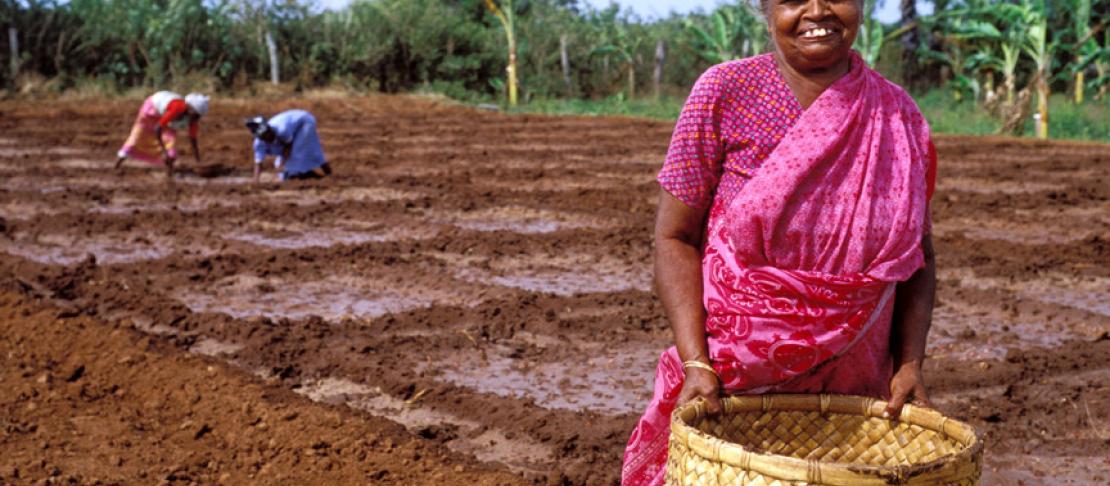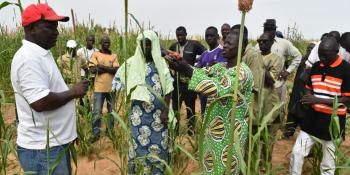IWMI’s vulnerability mapping shapes Sri Lanka’s National Climate Change Adaptation Strategy

Summary
The research was implemented in collaboration with the International Water Management Institute (IWMI).
The International Water Management Institute (IWMI) and its partners, Centre for Poverty Analysis (CEPA) and National Council for Disaster Management, Ministry of Disaster Management and Human Rights, Sri Lanka, conducted a study ‘Impact of Climate Change on Water Resources and Agriculture in Sri Lanka: A Review and Preliminary Vulnerability Mapping’, which significantly influenced Sri Lanka’s climate change strategies and policies. The study, a first of its kind, provided background information and identified research gaps on the impacts of climate change on the agricultural sector and water resources.
It used a climate change vulnerability index to identify climate change hotspots in agriculture, providing valuable insights into changes in precipitation, stress on water resources, and impacts on sectors such as paddy rice, tea, and coconut. In addition, suggestions were made for ‘no regrets’ adaptation interventions capable of addressing development and enhancing resilience, despite uncertainties.
IWMI’s analysis informed Sri Lanka’s Second National Communication (SNC) to the United Nations Framework Convention on Climate Change (UNFCCC) before COP16 in 2010. The study was then incorporated into the country’s National Climate Change Adaptation Strategy for 2011-2016, and several ‘no regrets’ interventions were included in the Strategy, including rainwater harvesting and restoration of an ancient water tank system to provide irrigation under drought, and water storage under floods. The study established the need for increasing the government’s capacity in climate change vulnerability analysis. IWMI supported this process by participating in various g overnment expert committees, and by organizing trainings for civil servants. The recommendations from the study also led to an initiative to set up climate stations across Sri Lanka.
Key facts
- The study was the first on impacts of climate change on water resources and agriculture in Sri Lanka, and the first to attempt vulnerability mapping for the entire country.
- It provided more accurate predictions of the impact of climate change on Sri Lanka’s agricultural sector.
- IWMI’s vulnerability mapping informed the Sri Lankan National Climate Change Adaptation Strategy for 2011-2016 and the country’s SNC submission to UNFCCC.
- Several ‘no regrets’ adaptation interventions were recommended, providing resilience and development gains despite the ambiguity of climatic models.
Lessons: key elements of success
- Timing of the study was critical, as it coincided with the SNC and National Climate Change Adaptation Strategy preparation processes.
- National media reported the story, raising public awareness and driving NGO engagement.
- Close collaboration with the Sri Lankan Ministry of Environment and stakeholders helped achieve impact.
- ‘No regrets’ interventions suggested in the study can work around the limitations of climate models.
Further reading
- Influencing climate change policy in Sri Lanka
- Influencing climate change policy in Sri Lanka
- Ex-post Impact Assessment of the Study: ‘Impact of Climate Change on Water Resources and Agriculture in Sri Lanka’
Related research outputs
- Eriyagama N, Smakhtin V. 2010. Observed and projected climatic changes, their impacts and adaptation options for Sri Lanka: a review. In: Evans, A; Jinapala, K. (Eds). Proceedings of the National Conference on Water, Food Security and Climate Change in Sri Lanka, Colombo, Sri Lanka, 9-11 June 2009. Vol. 2. Water quality, environment and climate change. Colombo: IWMI.
- Eriyagama N, Smakhtin V, Chandrapala V, Fernando K. 2010. Impacts of Climate Change on Water Resources and Agriculture in Sri Lanka: A Review and Preliminary Vulnerability Mapping. IWMI Research Report 135.


